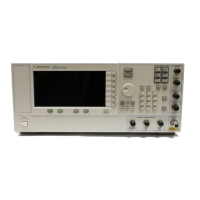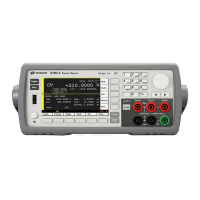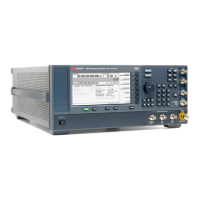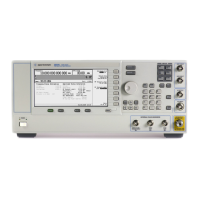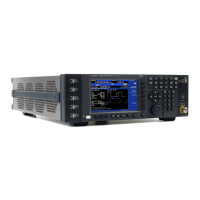4 Remote Interface Reference
242 Keysight 33210A User’s Guide
Arbitrary Waveform Commands
*OPT?
Query whether optional arbitrary waveforms are currently enabled. Returns “002”
if arbitrary waveforms are enabled. Returns “0” if arbitrary waveforms are not
enabled.
DATA VOLATILE, <value>, <value>, . . .
Download floating-point values from -1 to +1 into volatile memory. You can
download from 1 to 8,192 (8K) points per waveform. The function generator takes
the specified number of points and expands them to fill waveform memory.
– The values -1 and +1 correspond to the peak values of the waveform (if the
offset is 0 volts). For example, if you set the amplitude to
10 Vpp (0V offset),
“+1” corresponds to +5V and “-1” corresponds to -5V.
– The maximum amplitude will be limited if the data points do not span the full
range of the output DAC (Digital-to-Analog Converter). For example, the
built-in “Sinc” waveform does not use the full range of values between ±1 and
therefore its maximum amplitude is 6.087 Vpp (into 50 ohms).
– Downloading floating-point values (using DATA VOLATILE) is slower than
downloading binary values (using DATA:DAC VOLATILE) but is more
convenient when using trigonometric functions which return values from -1 to
+1.
–The DATA command overwrites the previous waveform in
volatile memory (and
no error will be generated). Use the
DATA:COPY
command to copy the
waveform to
non-volatile
memory.
– Up to four user-defined waveforms can be stored in non-volatile memory. Use
the DATA:DEL command to delete the waveform in volatile memory or any of
the four user-defined waveforms in non-volatile memory. Use the DATA:CAT?
command to list all waveforms currently stored in volatile and non-volatile
memory (as well as the five built-in waveforms).
To upgrade your 33210A to include arbitrary waveform functionality, go to
www.keysight.com/find/33210U.
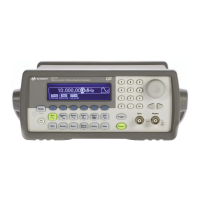
